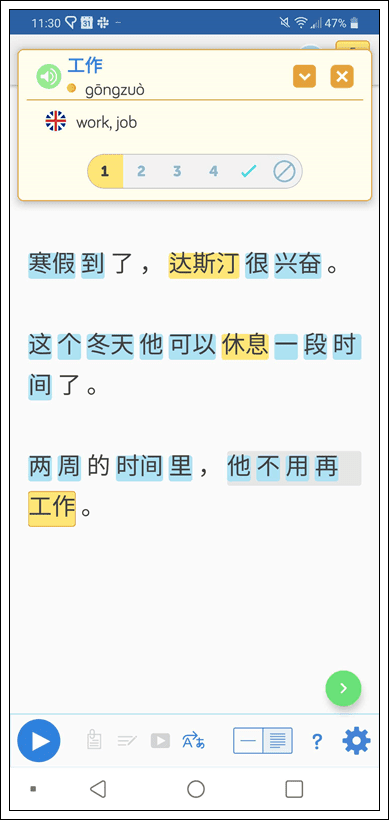Chinese Verbs and Why They’re Easy to Master
In our post about Chinese sentence structure, we mentioned that, “Chinese verbs have no tenses nor conjugations.”
If you ever want to talk about the past, present, or future, you can simply forget about conjugating the verb and instead, place the necessary characters next to the verb.
A quick example
Let’s take a look at the following verb: 吃 (chī) / to eat
大卫每天吃方便面 (Dàweì měitiān chi fāngbiànmiàn)
David eats instant noodles every day
Now let’s break down the sentence:
大卫 (Dàweì ) / David.
每天 (měitiān) / everyday
吃 (chī) / to eat
方便面(fāngbiànmiàn) / instant noodles or convenient noodles
Altogether, the sentence reads, “David eats instant noodles every day.”
Notice that the verb, 吃 (chī) remains the same.
Now let’s take a look at another sentence:
大卫每天吃过方便面 (Dàweì měitiān chīguò fāngbiànmiàn)
David used to eat instant noodles every day
吃过(chīguò) / to have eaten or used to eat
过 (guò) / is used to describe an action that has already been done
Once again, 吃过 stays the same. The only difference is that 过 comes after it.
Next…
大卫打算将来每天整天吃方便面(Dàweì dǎsuàn jiānglái měitiān zhěngtiān chī fāngbiànmiàn)。
David plans to eat instant noodles all day, every day in the future.
打算(dǎsuàn) / to plan
将来(jiānglái) / in the future
整天(zhěngtiān) / all day
As you can tell, the verb 吃 (chī) still remains the same.
Chinese verbs in context
Sometimes Chinese verbs can be used as either a noun, adjective, or even a greeting.
For instance, the noun, 小吃 (xiǎochī) means “snacks” or literally, “little bites.”
Meanwhile, the adjective, 好吃 (hăochī) means “it tastes good” or “good taste.”
As for this famous Chinese greeting:
你吃(过)了吗? (nĭ chī(guò)le mā) means “hello”, or literally, “have you eaten yet?”
It’s basically a Chinese way of asking someone “what’s up?”
Learn Chinese using content you love
It’s no secret that the more you read and listen, the better you’ll become at understanding Chinese. Even polyglot Steve Kaufmann agrees (he speaks 17 languages FYI).
However, reading Chinese can be difficult at first, especially since the characters are completely foreign to native English speakers.
But there’s a way to start reading right away…so you can learn faster.
Rather than looking up new words using a dictionary every minute and ruining your flow, check out LingQ. It’s the best way to learn Chinese online because it has a built in dictionary so you can easily look up words, save them, and review them in the ease of one platform.

Not only does LingQ make reading Chinese easier, it also is filled with thousands of hours of Chinese content. For example, if you’re a beginner, I recommend the Chinese mini-stories (pictured above).
These have been professionally transcribed so you can read and listen to the audio at the same time (and look up new words too). Not only that, but if you are feeling adventurous, you can import Chinese content from the web and study using videos from YouTube and much more. For example, you can import the transcripts from Chinese dramas (from the website Viki) and listen and read without any barriers. Best of all, you’ll learn at the same time.
Go check out LingQ today and make your studies a whole lot easier by discovering how to learn Chinese using content you love. Good luck.
Enjoyed this post? Check out polyglot and LingQ cofounder Steve Kaufmann’s blog post to learn about the similarities and differences between learning Korean vs Japanese vs Chinese!
***
Athena Zhang Baker has been studying Mandarin Chinese since she was 11. As of now, she is learning bits and pieces of other languages in addition to Chinese while running a Manga and Manhwa Club in Memphis, Tennessee, U.S.A. She hosts “Wonderful Web of Words” Wednesdays for all to her members wanting to learn Chinese and Japanese.


